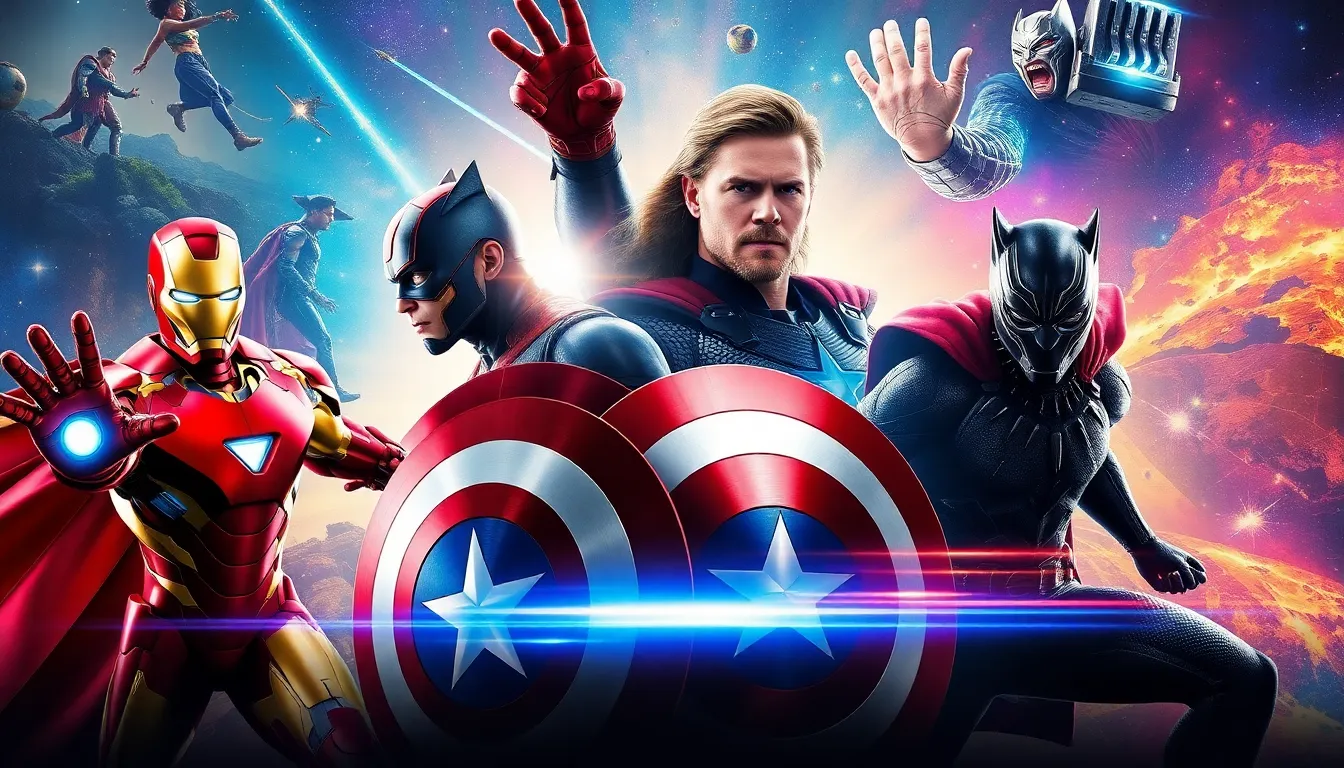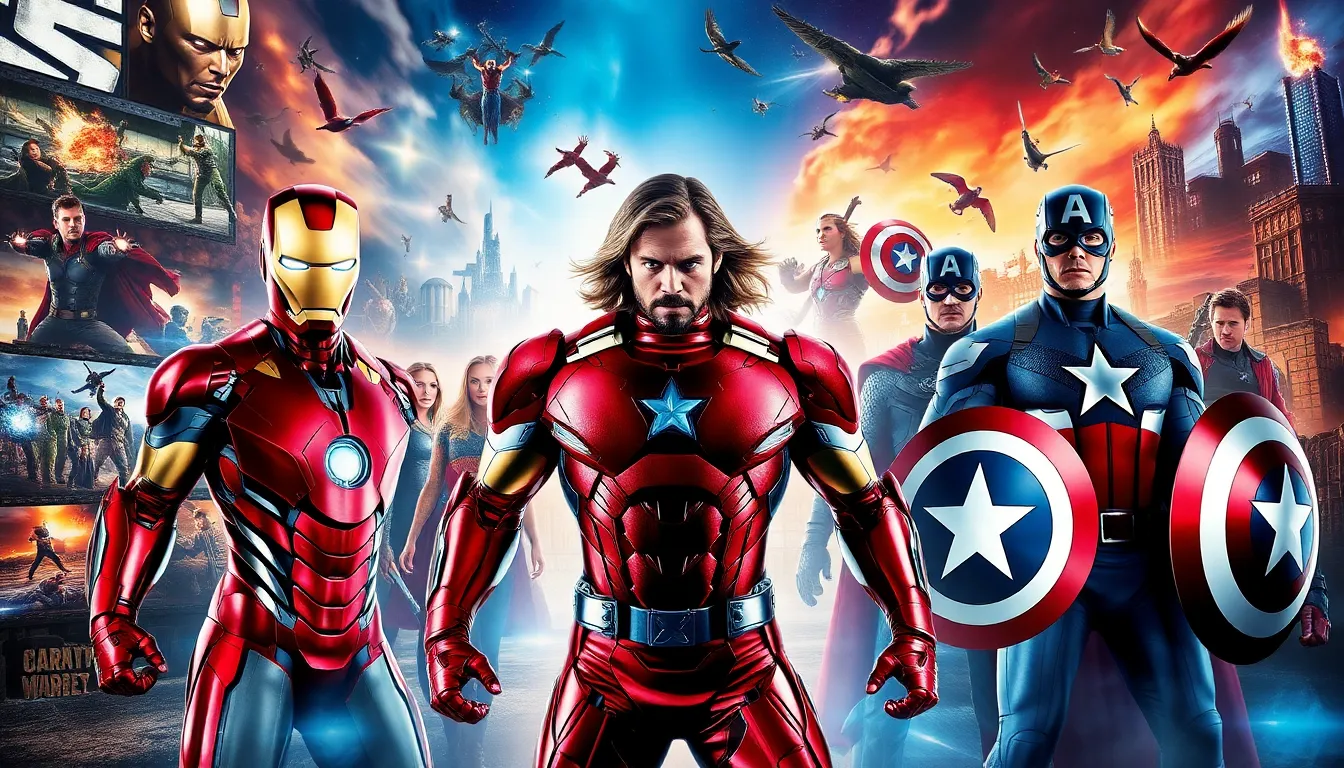Marvel’s cinematic universe has captivated audiences for over a decade, weaving intricate stories filled with iconic heroes and villains. With a vast array of movies and shows, fans often find themselves wondering how to navigate this expansive universe. From the explosive beginnings of the Avengers to the latest adventures in the multiverse, understanding the chronological order of these productions enhances the viewing experience.
This comprehensive guide lays out all Marvel movies and shows in order, making it easier for fans new and old to dive into the action. Whether it’s the thrill of Spider-Man swinging through the city or the cosmic battles of the Guardians of the Galaxy, each installment contributes to a larger narrative tapestry. Get ready to embark on an epic journey through the Marvel universe, where every story connects and every character matters.
Table of Contents
ToggleOverview of Marvel Cinematic Universe
The Marvel Cinematic Universe (MCU) stands as a landmark achievement in modern filmmaking, blending superhero narratives with interconnected plotlines. It features phases that each introduce new characters and expand existing story arcs.
Phases of the MCU
- Phase One (2008-2012)
Phase One established the core heroes and narratives, starting with Iron Man in 2008. Notable installations include The Incredible Hulk, Thor, and The Avengers, culminating in the first crossover of major characters.
- Phase Two (2013-2015)
Phase Two explored deeper character development while introducing new entities. Key films include Iron Man 3, Guardians of the Galaxy, and Ant-Man. Each movie contributes unique elements to the overarching plot.
- Phase Three (2016-2019)
Phase Three expanded the universe significantly, introducing properties like Black Panther and Spider-Man: Homecoming. The phase further connected previous storylines, reaching a climactic culmination in Avengers: Infinity War and Avengers: Endgame.
- Phase Four (2021-Present)
Phase Four transitions to Disney+, incorporating series like WandaVision and Loki. These shows intermingle with films, reinforcing character arcs. The introduction of new characters in Shang-Chi and the Legend of the Ten Rings and Eternals strengthens the MCU’s foundation for future developments.
Importance of Chronological Viewing
Understanding the chronological arrangement of films and shows enhances viewers’ comprehension of character growth and plot intricacies. Watching in order allows fans to appreciate developments within the MCU fully.
The MCU’s diverse range of stories and characters invites exploration, demonstrating Marvel’s ongoing commitment to engaging storytelling. Each phase contributes to a rich tapestry, making the viewing experience immersive and interconnected.
The Phases of Marvel

The Marvel Cinematic Universe (MCU) consists of distinct phases, each with a unique focus on character development and overarching narratives. These phases introduce new heroes and expand their stories, creating a cohesive universe.
Phase One Films
Phase One spans 2008-2012, introducing key characters and laying the groundwork for future stories. Significant films include:
- Iron Man (2008): Introduces Tony Stark, his transformation into Iron Man, and sets the tone for the MCU.
- The Incredible Hulk (2008): Explores Bruce Banner’s struggle with his dual identity as Hulk.
- Iron Man 2 (2010): Delves into Stark’s challenges with fame and new threats to his legacy.
- Thor (2011): Introduces Thor, a god exiled from Asgard, and lays the foundation for intergalactic conflicts.
- Captain America: The First Avenger (2011): Focuses on Steve Rogers’ transformation into Captain America during World War II.
- The Avengers (2012): Marks the culmination of Phase One, bringing together the original team of heroes to face Loki.
Phase Two Films
Phase Two, occurring from 2013-2015, emphasizes character depth and broader universe expansion. Key films include:
- Iron Man 3 (2013): Stark confronts his past traumas following the events of The Avengers.
- Thor: The Dark World (2013): Explores the realms of Asgard and introduces darker threats.
- Captain America: The Winter Soldier (2014): Focuses on political intrigue and the emergence of a powerful adversary.
- Guardians of the Galaxy (2014): Introduces a new team of cosmic heroes and expands the scope of the MCU.
- Avengers: Age of Ultron (2015): The Avengers face a technological threat, deepening their bonds and foreshadowing future conflicts.
- Ant-Man (2015): Introduces Scott Lang and the concept of shrinking technology, adding humor and a fresh perspective.
Phase Three Films
Phase Three unfolds from 2016 to 2019, transforming the MCU into a grand saga. Notable films include:
- Captain America: Civil War (2016): Divides the Avengers over ideological differences, setting the stage for future conflicts.
- Doctor Strange (2016): Introduces the mystical aspects of the MCU and the character of Doctor Strange.
- Spider-Man: Homecoming (2017): Offers a fresh take on Spider-Man’s journey as a young hero in a larger universe.
- Thor: Ragnarok (2017): Revitalizes the Thor franchise with humor and introduces new characters.
- Black Panther (2018): Explores Wakanda’s culture and themes of identity and responsibility.
- Avengers: Infinity War (2018): The Avengers unite to face Thanos, culminating in a dramatic conflict.
- Ant-Man and The Wasp (2018): Explores quantum realms and character dynamics amid larger MCU events.
- Captain Marvel (2019): Origin story of Carol Danvers, vital for the Infinity Saga.
- Avengers: Endgame (2019): Concludes Phase Three with epic character resolutions and final battles against Thanos.
Phase Four Films
Phase Four begins in 2021 and continues to expand through films and Disney+ series. Highlighted projects include:
- WandaVision (2021): Blends sitcom aesthetics with deeper themes of grief and loss, introducing new character arcs.
- The Falcon and the Winter Soldier (2021): Explores the legacy of Captain America and the challenges of heroism.
- Loki (2021): Examines alternate timelines and introduces the multiverse concept.
- Black Widow (2021): Delves into Natasha Romanoff’s past, revealing her struggles and sacrifices.
- Shang-Chi and the Legend of the Ten Rings (2021): Introduces a new hero and cultural elements within the MCU.
- Eternals (2021): Explores cosmic beings with a vast history linked to Earth.
- Spider-Man: No Way Home (2021): Bridges multiple universes, showcasing fan-favorite characters from previous franchises.
Future projects promise to continue expanding narratives and character explorations within the MCU.
Marvel Television Shows
Marvel’s television shows offer compelling narratives that complement the cinematic experiences found in the movies. These series explore various characters and themes, enriching the broader Marvel Universe.
The Netflix Series
The Netflix series provide a darker, grittier take on the Marvel landscape. Key titles include:
- Daredevil (2015-2018): This series follows Matt Murdock, a blind lawyer by day and vigilante by night, as he fights crime in Hell’s Kitchen.
- Jessica Jones (2015-2019): Jessica, a private investigator with superhuman strength, confronts her traumatic past and battles adversaries with sinister powers.
- Luke Cage (2016-2018): This series centers on Luke Cage, a man with unbreakable skin, who fights for justice in Harlem.
- Iron Fist (2017-2018): Focusing on Danny Rand, who returns to New York City with extraordinary martial arts skills, this series explores his quest for identity.
- The Defenders (2017): A miniseries featuring crossover characters from the previous series, they unite to protect New York from an emerging threat.
- The Punisher (2017-2019): Following Frank Castle, a vigilante seeking vengeance, this series examines themes of violence and morality.
The ABC Series
The ABC series showcase a blend of comic book elements with procedural storytelling. Notable shows in this category include:
- Agents of S.H.I.E.L.D. (2013-2020): This series follows Phil Coulson and his team of agents as they tackle various threats to global security, connecting to the MCU films.
- Agent Carter (2015-2016): Set after World War II, Peggy Carter balances her post-war life with her work in intelligence, aiming to prove herself in a male-dominated field.
- Inhumans (2017): Focusing on the royal family of Inhumans, this series delves into their struggles and conflicts on Earth.
Disney+ Original Series
Disney+ original series represent a new era in Marvel storytelling, expanding the universe through character-driven narratives. Key titles include:
- WandaVision (2021): This series combines classic sitcom styles with a deeper exploration of grief, following Wanda Maximoff and Vision’s unique reality.
- The Falcon and the Winter Soldier (2021): Following Sam Wilson and Bucky Barnes, the series addresses themes of legacy and heroism in a post-Captain America world.
- Loki (2021): Centering on the God of Mischief, Loki, this series explores concepts of identity and fate within the multiverse.
- What If…? (2021-Present): An animated anthology that examines alternate realities within the MCU, offering fresh takes on iconic storylines.
- Hawkeye (2021): This series follows Clint Barton and young archer Kate Bishop as they tackle past threats and navigate new challenges.
The Marvel television shows enrich the connections within the MCU, providing fans with deeper insights into characters and stories that extend beyond the films.
Notable Marvel Characters
The Marvel universe features a diverse range of characters, including iconic heroes and formidable villains. Each character plays a crucial role in the intricate narratives that define the Marvel Cinematic Universe.
Heroes
- Iron Man (Tony Stark): Genius billionaire and philanthropist. He created the Iron Man suit, which revolutionized superhero technology.
- Captain America (Steve Rogers): Super soldier and symbol of patriotism. His leadership has united various heroes in critical battles.
- Thor: Norse god of thunder. His unique powers and hammer, Mjolnir, set him apart as a formidable hero.
- Black Widow (Natasha Romanoff): Expert spy and combatant. Her past enhances her complexity as she seeks redemption.
- Spider-Man (Peter Parker): Young hero with spider-like abilities. His journey balances personal struggles with a commitment to save others.
- Black Panther (T’Challa): King of Wakanda and master strategist. His advanced technology and combat skills highlight his leadership.
- Doctor Strange (Stephen Strange): Master of the mystical arts. His knowledge of magic allows him to protect reality from threats.
- Captain Marvel (Carol Danvers): Powerful hero with cosmic abilities. Her strength significantly impacts the battles against intergalactic foes.
Villains
- Thanos: Mad Titan and archvillain. He seeks the Infinity Stones to impose his will on the universe, aiming for balance through destruction.
- Loki: God of mischief and master manipulator. His complex relationship with Thor adds depth to his character as both foe and ally.
- Killmonger (Erik Stevens): Antagonist driven by vengeance. His ideals challenge the moral foundation of the heroes, particularly Black Panther.
- Ultron: AI villain created from Tony Stark’s technology. His mission to eradicate humanity presents a significant threat to Earth.
- Hela: Goddess of death and Thor’s sister. Her ambition to conquer Asgard makes her one of the deadliest foes superheroes face.
- Green Goblin (Norman Osborn): Iconic Spider-Man adversary. His personal vendetta and unpredictable nature make him a dangerous enemy.
- Vulture (Adrian Toomes): Tech-savvy thief with a personal grudge against Tony Stark. His motivations highlight the theme of collateral damage in heroism.
- Kingpin (Wilson Fisk): Crime lord with strategic intelligence. His impact on Hell’s Kitchen and connections to Daredevil deepen the narrative of organized crime.
Impact on Pop Culture
Marvel’s influence on pop culture is profound and far-reaching. The cinematic universe not only redefined superhero films but also reshaped mainstream entertainment. Audiences engage with Marvel characters and stories beyond the screen, fostering a global community of fans.
Marvel movies and shows generated significant revenue, contributing to box office records and leading franchises. The Avengers (2012) became a cultural phenomenon, showcasing the success of interconnected narratives. This successful formula changed the landscape of Hollywood, prompting studios to adopt similar approaches to their franchises.
Merchandising also plays a crucial role in Marvel’s pop culture impact. Action figures, apparel, and collectibles fill shelves worldwide, responding to the immense demand from dedicated fans. Events like San Diego Comic-Con celebrate this cultural phenomenon, spotlighting new releases and connecting fans with creators.
Social media has amplified Marvel’s cultural relevance. Platforms like Twitter, Instagram, and TikTok host vibrant discussions and fan theories, enhancing viewer engagement. Hashtags like #MarvelCinematicUniverse and #MCU generate extensive conversations, allowing fans to share their experiences and reactions in real-time.
Moreover, diversity and representation in Marvel’s projects resonate with audiences. Films like Black Panther (2018) and Shang-Chi and the Legend of the Ten Rings (2021) spotlight underrepresented communities, igniting conversations about inclusivity in mainstream media. This shift positions Marvel not just as entertainment but as a catalyst for social dialogue and change.
From memes to parodies, Marvel’s characters penetrate various media. Iconic quotes and images spark creativity among fans, infusing everyday culture with their favorite elements from the universe. This cultural integration solidifies Marvel’s status as a cornerstone of modern pop culture, influencing not just film but music, art, and fashion.
The interconnected nature of Marvel properties continues to reshape audience expectations. Viewers anticipate crossover events and character cameos as part of their viewing experience. This expectation heightens excitement around new releases and encourages audiences to explore the entire Marvel franchise, enhancing its lasting impact on pop culture.
Conclusion
Marvel’s cinematic universe has captivated audiences with its intricate storytelling and beloved characters. By following the chronological order of movies and shows, viewers can fully appreciate the depth of character development and overarching narratives. Each phase contributes uniquely to the larger saga, enriching the experience for both new fans and seasoned followers.
As Marvel continues to expand its universe through innovative films and engaging series, the journey through its stories promises to grow even more exciting. Fans can look forward to new characters and evolving plots that will further intertwine the Marvel legacy. The interconnected nature of these narratives ensures that the adventure never truly ends.



